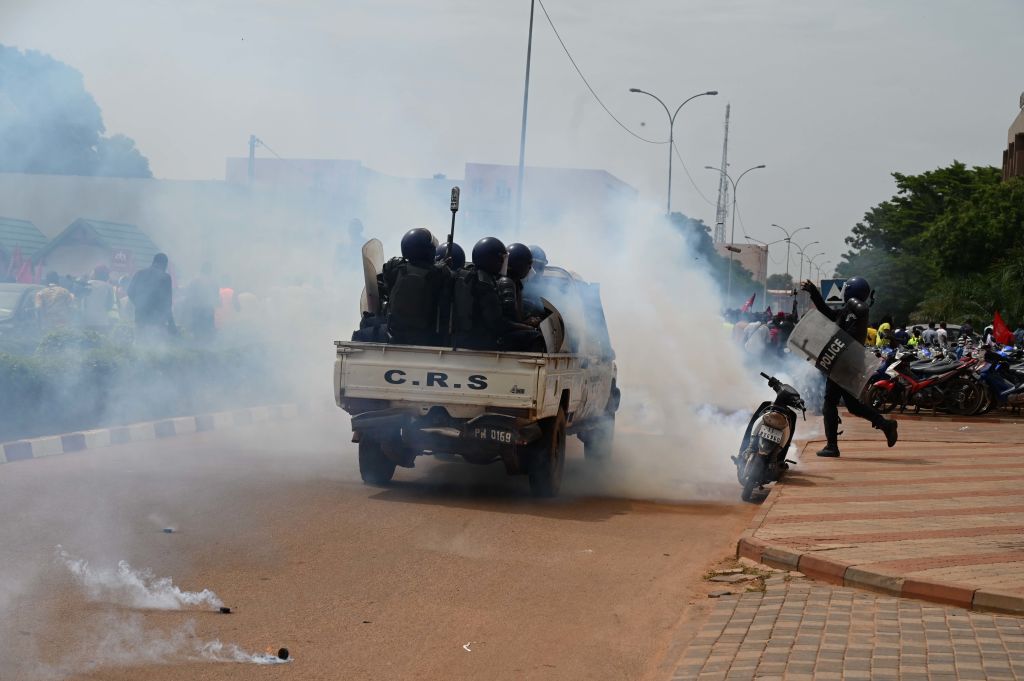The Jama’at Nusrat al-Islam wal-Muslimin terror group unexpectedly stormed the northern Burkina Faso town of Djibo early May 11 and began an onslaught that killed more than 100 civilians, Soldiers and paramilitary members.
The jihadists, known as JNIM, also abducted dozens of Soldiers and civilians, including women. Videos on social media showed JNIM fighters looting and destroying an Army camp and gendarmerie and police headquarters. According to the International Crisis Group, the terrorists also torched a medical center, pharmacy and market.
The al-Qaida-affiliated group has gradually gained strength since its formation in 2017. Citing regional and Western officials, The Washington Post reported that the group is now the most well-armed militant force in West Africa and among the most powerful in the world, commanding up to 6,000 fighters.
It is increasingly expanding its informant and supply chain networks into stable nations such as Ghana, Guinea and Senegal. Its violence also is spreading southward and westward. Weeks before the Djibo attack, the group killed 54 Beninese Soldiers near the borders with Burkina Faso and Niger.
“They’re creating a proto-state that stretches like a belt from western Mali all the way to the borderlands of Benin. … It is a substantial — even exponential — expansion,” Héni Nsaibia, West Africa senior analyst for the Armed Conflict Location & Event Data project, told The Washington Post.
According to the research project, the group has killed almost 6,000 civilians in the past five years. Local strategies to combat JNIM’s rise have been unsuccessful, and atrocities committed by security forces, particularly against the Fulani ethnic group, have driven local recruitment into the group.
Amadou Diallo, a 69-year-old Burkinabe refugee, said his three daughters and their husbands joined the group after its members killed scores of their fellow Fulani. “They were afraid, and they ran to them,” Diallo told The Washington Post.
The group is known to storm Burkina Faso mosques to announce its intent to implement strict Islamic law, close schools and target state institutions. Resistance to the group is met with violence.
Ali Diallo, a 53-year-old herder from Burkina Faso’s Boucle du Mouhoun region, was washing himself before prayers at his local mosque in 2023 when a group of bearded, machine gun-toting men forced him and others inside and locked the door.
“I thought we were going to die,” Diallo told The Washington Post. “But two men stood where the imam usually stood and started preaching. They said their fight was with the government and their goal was to spread Islam, not to kill us.”
However, JNIM closed his children’s school shortly thereafter. The terrorists also imposed strict dress codes, with veils required for women and pants for men. They banned naming and wedding ceremonies and loud music.
In many areas it controls, the group charges taxes to help fund its operations and collects tolls on roads it controls. Many of its weapons are looted from militaries it attacks. It uses social media to spread propaganda critical of local governments and shows no signs of easing its expanding reign of terror.
On June 1, the group killed more than 30 Soldiers at a military base in Mali. In a separate attack that day, it attacked a military airport and Russian mercenaries in Timbuktu, where residents said the terrorists hit multiple positions with heavy gunfire and shelling.
“Based on the evidence that is emerging, the scale of the assault and the immediate claims by JNIM suggests this was a long-term and carefully planned attack,” Byron Cabrol, senior Africa analyst at Dragonfly, told Reuters.
Amid the group’s southward spread, Benin has reported nearly as many deaths in the first three months of this year than in all of 2024, while Togo reported the most terrorist attacks in its history.
On June 12, the group claimed it looted and took control of a Beninese outpost in Basso, three miles from the Nigerian border. Basso is 134 miles south of the tri-border area Benin shares with Burkina Faso and Niger.
The attack’s proximity to the border and distance from JNIM’s primary area of operations near the Park W complex indicate that the attackers likely came from Nigeria. Militants based in Nigeria’s Kainji reserve likely launched the attack, according to researchers at the Institute for the Study of War.
“JNIM’s presence in the Kainji area is an attack risk for Nigeria, especially given the likely fluid relationships among JNIM-linked militants and other, more Nigerian-focused groups in the Kainji area,” the institute’s researchers wrote.

